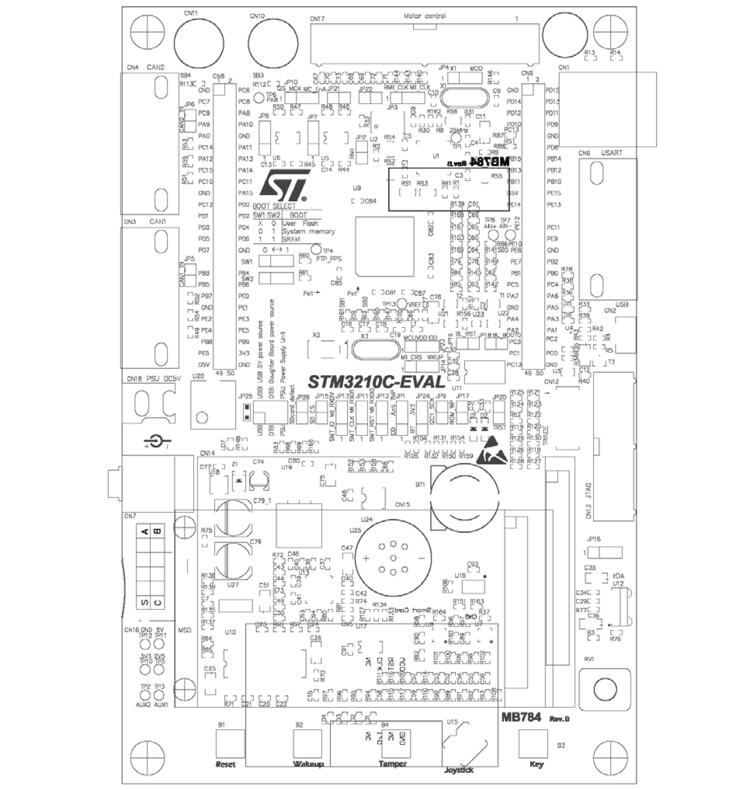STM3210C Evaluation
Overview
The STM3210C-EVAL evaluation board is a complete development platform for STMicroelectronic’s ARM Cortex-M3 core-based STM32F107VCT microcontroller.
The range of hardware features on the board help you to evaluate all peripherals (USB-OTG FS, ethernet, motor control, CAN, microSD CardTM, smartcard, USART, audio DAC, MEMS, EEPROM and more) and develop your own applications.
Extension headers make it easy to connect a daughterboard or wrapping board for your specific application.
More information about the board can be found at the STM3210C-EVAL website [1].
Hardware
STM3210C-EVAL provides the following hardware components:
- Three 5 V power supply options:
Power jack
USB connector
daughterboard
Boot from user Flash, system memory or SRAM.
I2S audio DAC, stereo audio jack.
2 GByte (or more) microSD CardTM.
Both type A and B smartcard support.
I2C compatible serial interface 64 Kbit EEPROM, MEMS and I/O expander.
RS-232 communication.
IrDA transceiver.
USB-OTG full speed, USB microAB connector.
IEEE-802.3-2002 compliant ethernet connector.
Two channels of CAN2.0A/B compliant connection.
Inductor motor control connector.
JTAG and trace debug support.
3.2” 240x320 TFT color LCD with touch screen.
Joystick with 4-direction control and selector.
Reset, Wakeup, Tamper and User button.
4 color LEDs.
RTC with backup battery.
MCU consumption measurement circuit.
Extension connector for daughterboard or wrapping board.
- More information about STM32F107VCT can be found here:
Supported Features
The Zephyr stm3210c_eval board configuration supports the following hardware features:
Interface |
Controller |
Driver/Component |
|---|---|---|
NVIC |
on-chip |
nested vector interrupt controller |
UART |
on-chip |
serial port-polling; serial port-interrupt |
PINMUX |
on-chip |
pinmux |
GPIO |
on-chip |
gpio |
CLOCK |
on-chip |
reset and clock control |
FLASH |
on-chip |
flash memory |
WATCHDOG |
on-chip |
independent watchdog |
Other hardware features are not yet supported in this Zephyr port.
The default configuration can be found in boards/st/stm3210c_eval/stm3210c_eval_defconfig.
Connections and IOs
Each of the GPIO pins can be configured by software as output (push-pull or open-drain), as input (with or without pull-up or pull-down), or as peripheral alternate function. Most of the GPIO pins are shared with digital or analog alternate functions. All GPIOs are high current capable except for analog inputs.
Board connectors:

Default Zephyr Peripheral Mapping:
UART_2_TX : PD5
UART_2_RX : PD6
USER_PB : PB9
LED2 : PD13
Programming and Debugging
Flashing
STM3210C-EVAL board includes an ST-LINK/V2-1 embedded debug tool interface. At power-on, the board is in firmware-upgrade mode (also called DFU for “Device Firmware Upgrade”), allowing the firmware to be updated through the USB. This interface is supported by the openocd version included in Zephyr SDK.
Applications for the stm3210c_eval board configuration can be built and
flashed in the usual way (see Building an Application and
Run an Application for more details).
Flashing an application to STM3210C-EVAL
Connect the STM3210C-EVAL to your host computer using the USB port, then build and flash an application in the usual way.
Here is an example for the Blinky application.
# From the root of the zephyr repository
west build -b stm3210c_eval samples/basic/blinky
west flash
You will see the LED blinking every second.
Debugging
You can run a serial host program to connect with your STM3210C-EVAL board. For example, on Linux:
$ minicom -D /dev/ttyACM0
You can debug an application in the usual way. Here is an example for the Hello World application.
# From the root of the zephyr repository
west build -b stm3210c_eval samples/hello_world
west debug